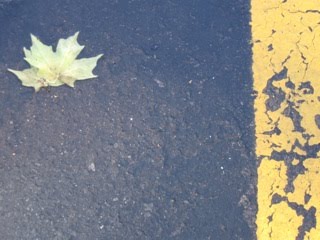This is what a wise dharma friend who works in Chinese medicine once told me when I was worrying about bringing my then newborn son outside on a snowy day. As a November baby, I had lots of opportunities to expose him to the cold of an upstate New York winter while still at a tender age. And I have had countless opportunities to expose him to my own fears.
The path of parenthood is littered with fear and neurosis at times. New fears spring up daily, as the world can seem a very threatening place when caring for such vulnerable beings. And then there are the old fears, some buried very deep indeed, resurrected from our own childhoods and adolescence by seeing our children experience phenomena and other beings, with everything that can entail.
We can't protect our children from the world. What we can do is nurture in them both confidence in and curiosity about themselves and other beings and the world they live in. When we voice our fears to them or in front of them, that can cloud their own seeing. I don't mean we refrain from warning them not to touch a hot stove or not run into the street or not to drink and drive. But we can keep those warnings direct and pithy, and take action around them, rather than projecting the possibility of catastrophes or unnecessarily elaborating on imaginary dangers. Mindfulness of speech is our skillful means in this practice. We need to start with our own inner dialogues as parents, noticing when we are engaged in fearful or anxious thinking and gently letting it go.
We can encourage our children to explore the world and the people in it while holding them in our awareness. "Give the cow a wide meadow" is a common teaching for beginning meditators - it is a reminder to not be too tight with our meditation practice, which can lead to claustrophobia and difficulty in sitting. The same can happen with our parenting; when we notice things are too tight and we all are feeling overly anxious, we can give our children a wide meadow to explore in, while making sure the boundaries that surround it are secure. Protecting our children from our discursive, fearful thought patterns is a powerful way to secure those boundaries for them, so they experience the world with greater sanity and clarity.
Chogyam Trungpa taught that the world is basically good, and fundamentally trustworthy. This can be hard to have faith in at times, when so many dangers seem to surround us. But the more we can perceive things with clarity, unclouded by our projections, we can discern what will harm and what will nurture. We can bring the well wrapped baby out for a winter walk, or teach our teenager how to drive safely. We can do these things simply, without internal or external fretting and doubts. I think the more we do this, the more the goodness of the world will be revealed and our trust in it will increase. And perhaps we will learn to trust ourselves more as well.
Thursday, December 2, 2010
Subscribe to:
Post Comments (Atom)


No comments:
Post a Comment